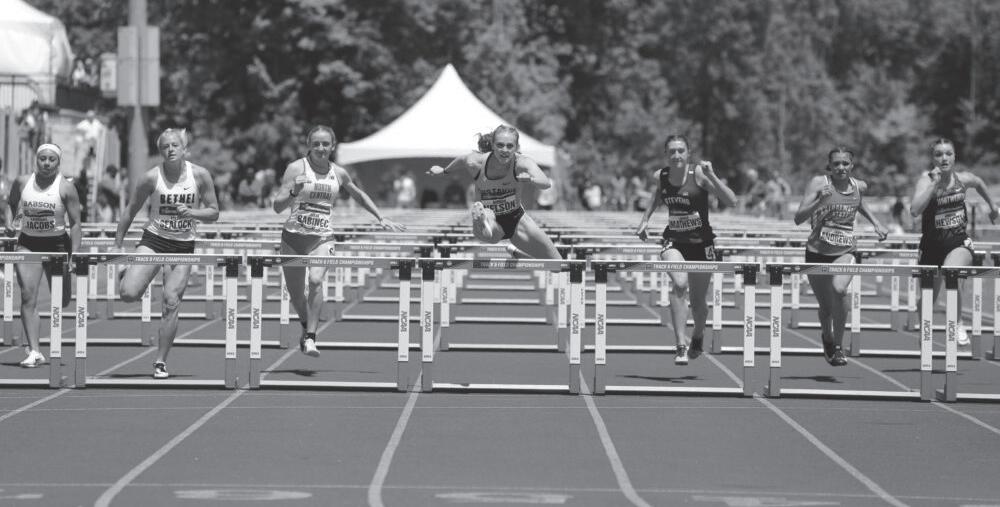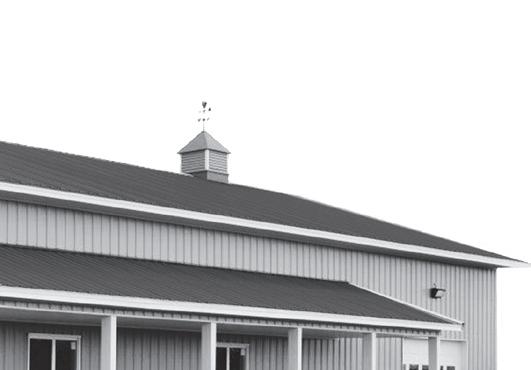
10 minute read
Birgen Nelson Exemplifies the Gustavus Student Athlete
Success in college requires determination, consistency, resiliency— and help. As Birgen Nelson ’23 heads into her final indoor track meet before moving on to the next athletic and academic levels, she’s embraced and personified all these qualities and positioned herself for a promising future.
This weekend, Nelson and fellow All-American Annika Poe ’23 (shot put), will be in Birmingham, Alabama for the NCAA Division III Indoor National Championships. Nelson aims to equal or top her national record time in the 60-meter hurdles and add to her multiple All-America honors. Between those past and potential achievements, her Academic All-America awards, her dozen or so school records, and other recognitions too numerous to list, it’s little wonder Gustavus Sports Information Director CJ Siewert calls Nelson one of the greatest athletes ever at Gustavus. On top of that, she’s also a political science and classical languages double major (and environmental studies minor), Student Senate copresident, the recipient of numerous academic and co-curricular honors, and a fixture on the Dean’s List.
Advertisement
to be for various farm operations.
The survey summary lists the average custom rate, as well as a range, for various tillage, planting, fertilizer and chemical application, grain harvesting, and forage harvesting functions on the farm. The survey also includes many miscellaneous farming practices, average per hour farm labor rates and includes a formula for calculating rental rates.
The survey lists the average custom farming rates for corn, soybeans and small grain. The average custom rates for farm operations in most other areas of the Upper Midwest tend to be very close to the average Iowa custom rates.
Average 2023 farm custom rates for some typical tillage, planting, and harvesting practices, as well as custom farming rates, are listed in the adjoining table. The complete 2023 Iowa Farm Custom Rate Survey for all farming practices is available on-line at the following Iowa State University website: https://www.extension.iastate.edu/ agdm/crops/html/a3-10.html
Based on the Iowa State data, most average custom rates for tillage, planting and harvest operations in 2023 are expected to increase by about 10 to 15%, compared to the rates for similar operations in 2022.
The 2023 custom farming rates for corn and soybean production are also expected to increase by about 10 to 12% compared to a year earlier, with an increase of nearly 20%
Birgen with her coach Aaron Lund at Gustavus Night at the Twins in 2022, where she threw out the first pitch.
That Nelson would compile so many impressive achievements wasn’t inevitable. At Edina High School, she was a competitive cheerleader, but her plans to continue the sport in college were derailed by multiple concussions and a shoulder injury. The setbacks were compounded by serious illness, and challenges to her mental health. “I was really stressed all the time,” she said. “My school had a weird atmosphere where if you weren’t taking seven AP classes and getting all A’s in them, it made you feel worthless.” The issues caused her to miss about 100 days of classes. “I almost didn’t graduate. I had injuries and got really sick, and I was also depressed and just stopped going to school,” she said. “I’d been high achieving and then suddenly just couldn’t do it anymore. That’s when [people around me] said, ‘Hey, you gotta [address this].’ So, it was good they helped me see that.”
Nelson entered a program through the school that required her to take a year’s worth of classes in a single semester to make up the lost time. Once back on track, she began to consider colleges. Gustavus quickly emerged, partly because of her father’s encouragement—his aunt is an alum and he’d visited campus frequently as a child—and partly because of the opportunities Nelson would have here. Her first few semesters at Gustavus weren’t a smooth ride, either. She considered transferring because of personality conflicts with a couple of older track teammates. “But I said, ‘I can’t let them ruin my experience and force me to change,’” she said. “And I really liked the track coaches, and I still love them. As I got more involved, things got really, really good.”
She’s hit her stride. Her student government work has included helping write the College’s student protest policy, working on the Arboretum renaming efforts, helping bring more anti-racism awareness to the entire community, and testifying before state lawmakers on behalf of the Minnesota State Grant, which helps students from low- and moderateincome families afford the college of their choice.
One of Nelson’s advisors, Political Science Professor Mimi Gerstbauer, notes that accomplishing everything Nelson has, even at a school the size of Gustavus, remains rare. “She really knows how to manage her time and plan,” Gerstbauer said. “Being Student Senate co-president here while also being an athlete is highly unusual.”
Dean of Students Megan Ruble, who’s gotten to know Nelson and her Senate co-president, Delaney Bluhm ’23, as their adviser, isn’t surprised Nelson found a way to work through her early angst and obstacles. “It’s rare to have a student who’s very successful and very involved but is still so laid back,” Ruble said. “She’s a careful decision-maker and a good thinker, and man, she’s resilient.”
Nelson, who was granted eligibility from the NCAA for three extra track seasons (two indoor, one outdoor) after COVID-related cancellations, will graduate in May. Then, she heads to Duke University to run with the Division I Blue Devils while working toward her Master’s degree in public policy. Her future career path might include everything from professional track and field competing and coaching to politics or law school—or all of the above. Those who know her best are eager to see what’s next. “Duke and their Durham campus had that small-community feel to it and the academic major she was most passionate about, and she found a team and a coaching staff that honestly is a lot like ours,” said Gustavus Track and Field head coach Aaron Lund. “Birgen’s intrinsic motivation is just at an elite level, and there are a lot of different roads she could take.”
As her undergraduate years near the finish line, Nelson chalks up much of her success to Gustavus itself. “I’ve been able to get everything out of Gustavus that I thought I could, and even more,” she said. “I’ve received a ton of help from the Career Center, along with all these other things that this school offers that I don’t think I would have gotten at a big university. If I had gone somewhere else, I wouldn’t be where I am today.”
—Update: Birgen won her event at the 2023 Division III Indoor Track and Field National Championships on March 10-11 with a record time of 8.39 seconds, meaning she now holds the top five times in the Division III 60-meter hurdles. To view the race and event results, visit these links:
Live Stats: https://live.deltatiming. com/meets/20071/events/727895/ live Live Video: https://www.ncaa. com/event/4265
conTineD FroM 1
Rural Nicollet County Land Owners Upset Over Construction Project
these problems.
AsK A TroPPer
By Sgt. Troy Christianson Minnesota State Patrol
Question: What is the requirement for displaying front and rear license plates in Minnesota? What is the fine for not displaying both?
I notice a lot of vehicles without a front plate, especially on Corvettes and Tesla cars.
Answer: Corvettes and Tesla’s are required to have a front license plate in Minnesota, this is a common equipment violation. Minnesota State Statute (M.S.S.) 169.79 states: “No person shall operate, drive or park a motor vehicle on any roadway unless the vehicle is registered in accordance with the laws of this state and has the license plates or permit confirming that valid registration or operating authority has been obtained.”
Vehicles that are allowed to display only one license plate include motorcycles, a dealer’s vehicle or vehicle in-transit, classic car, collector car or a vehicle that is of model year 1972 or earlier that is not registered as a collector vehicle and is used for general transporta- with the company started last spring. They arose from supply chain issues to get electrical components, so there were delays. There were some other issues as well, according to the county. There has been a dispute between the county and the company about what was owed and for additional work that the company felt they had already accomplished or forced to do as part of the contract. The two entities went to mediation last winter to attempt resolving the issues. The county’s position was that the claims weren’t proper. The county still wanted the company to continue working on the project and would deal with the claims at a later time. The company assumed its work was complete throughout last summer and fall. At that point, they made a request for final payment plus additional money they assumed they were owed pursuant to the contract terms. They were allowed to make claims for extra work if they performed extra work on the project. The county did not agree that all the claims for work were appropriate and went to mediation. The company made several claims during mediation. For example, one claim for about $199,000 for contract work completed that wasn’t paid for. They also asked for $454,000 for additional work. It included delay in getting the award after the bidding process, additional electrical work necessary for pump retrofitting, increased pumping costs, a larger trash grate that needed to be bigger than the design, out-of-sequence work, incorrect labeling for a pipe in the designs (for which they incurred about $75,000 in damages), replacement of a service door on the electrical building and changing pipe grade.
Display Ad Network program by running the classified section of your newspaHowever, the decision is ultimately up to slightly in size to fit your column sizes. call MNA at 800/279-2979. Thank you.

The county felt there were defects in the construction and did not agree that the work or costs were appropriate. For example, a temporary dike was not removed. Also, there were issues with settling after the piping. The county alleges the company didn’t complete the project on time. The county felt anything owed should be offset by
conTinueD FroM 1
The mediator felt the county should consider paying the company about $230,000 and release them from any further obligations to perform work on the project, so the county wouldn’t have to fix anything else like the prefab building, the removal of the temporary dike and so forth. Their warranties would remain in place. That would be the total of the contract plus about $30,000 of the roughly $450,000 they are claiming. The board approved that amount for the mediation settlement.
A Courtland resident spoke to the board about seepage problems that weren’t repaired. He said those problems were the engineers’ fault. He said the work and project should not be accepted. He said neither the county nor the company can “wash their hands” of what has been done. He said they “did a half-ass job”. He said the company showed up in the middle of winter, skipped a summer season and came back again another winter to perform work.
John Luepke, of Courtland,

echoed that sentiment and said the company was having financial problems as well, but the pump system and engineering was faulty.
“If we give them the money and we go bankrupt, how are we going to get anything back out of that?” Luepke asked.
Other residents in the county also voiced their concerns, including a man from Brighton Township.
“I’m not surprised we’re sitting here today with these problems,” he said. “These were foreseen as this process unfolded.”
He said he was disappointed in the entire process from the county and said landowners were denied a public hearing in 2018 after delays and said landowners are stuck with the problems and the expense. Another resident said he hoped the county doesn’t cut the company a check.
However, if the county refuses to pay, they could be liable under the contract terms, for the amount total plus extra work and 18 percent annual interest and attorneys fees from litigation.
Nicollet County Sees Tiny Increase in Population According to Census
manager at Greater Mankato Growth, LeSueur, Nicollet and Blue Earth counties grew the most due mostly to international migration to the area, thanks in part to Minnesota
1
State University and Gustavus Adolphus College. Blue Earth and Nicollet Counties saw a 300 person gain from international migration, Vessey told the Free Press.
County Juvenile Detention Center
Focus on Ag Continued From Page Two
in the past five years. The cost for new and used machinery continued to increase in the past 12 months, which together with increasing fuel costs, higher repair costs and higher labor charges, accounts for the increases in 2023 custom rates. It should be noted that many of these factors could change by the end of 2023, which may result in custom operators adjusting their final custom rates even more by year-end to more fully reflect any changes in the expenses for custom operations.
All listed custom rates in the Iowa Survey results include fuel, labor, repairs, depreciation, insurance and interest, unless listed as rental rates timeliness, field size, etc., and could be adjusted later in the year due to changes in economic factors.
Selected 2023 Farm Custom
Rates Following are the average custom rates for some common farming practices for 2023, as well as the (range) of custom rates listed, based on the Iowa Farm Custom Rate

Survey: Custom Farming Rates (includes tillage, planting and harvesting costs)
• Corn – $152.60 per acre (Range = $75-$275 per acre)
• Soybeans – $139.65 per acre (Range = $70-$275 per acre)
• Tandem Disk – $17.55 per acre
($10-$25.80 per acre)
• Chopping Corn Stalks – $14.80 per acre ($10-$20 per acre)
Planting and Spraying
• Planter With Attachments –$27.10 per acre ($15-$35 per acre)

• Planter Without Attachments –$24.70 per acre ($13-$36 per acre

• No-Till Planter – $27.10 per acre
($12.75-$42.50 per acre)
• Soybean Drill – $20.20 per acre ($13-$27.50 per acre)
• Grain Drill – $17.70 per acre ($10-$20 per acre)
• Crop Spraying (broadcast) –$10.35 per acre ($6.75-$16 per acre) (self-propelled sprayer)
• Corn Grain Cart (in field) –$7.35 per acre ($.50-$18 per acre)
• Soybean Grain Cart (in field) –$6.25 per acre ($.50-$15 per acre)
• Hauling Grain (5 mi. or less)
– $0.135 per bushel ($.06-$.18 per bushel)
• Hauling Grain (5-25 mi.) – $0.21 per bushel ($.09-$.40 per bushel)
• Grain Drying (continuous flow)
– $0.045 per point per bushel (incl. fuel, electricity & labor)
Harvesting Forages
• Windrowing Hay – $17.80 per acre ($16-$20 per acre)
• Hay Baling (small square bales)
– $0.89 per bale ($.60-$1 per bale)
• Hay Baling (large bales) –




